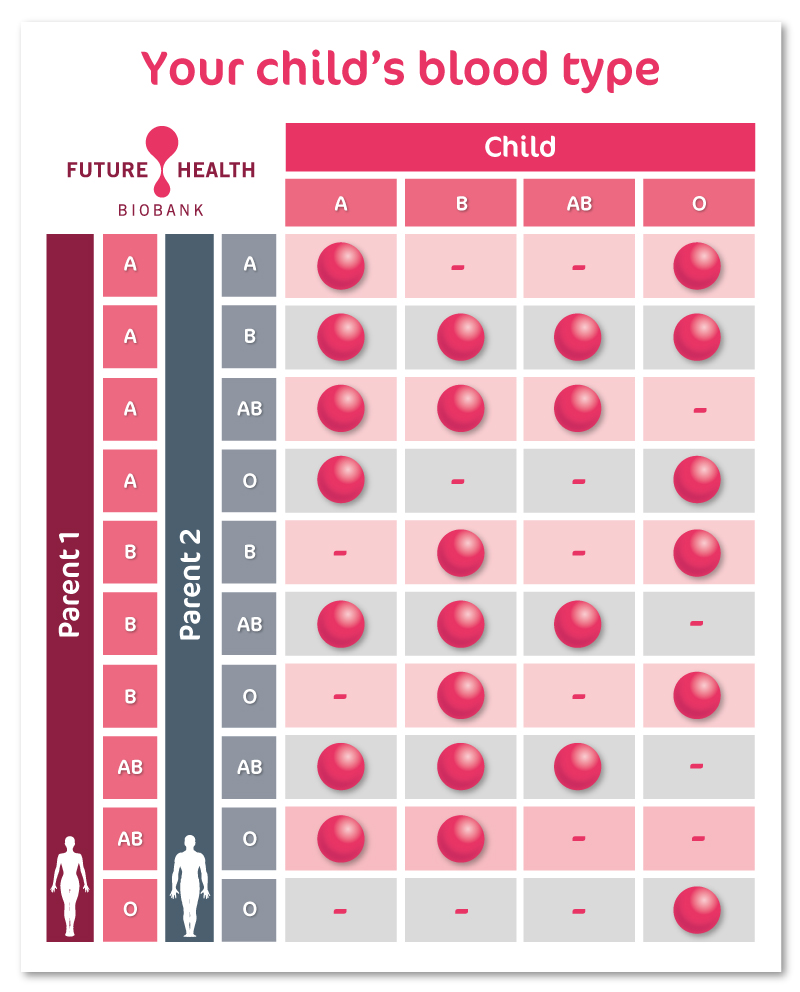Chances Your Baby Wkll Have Your Blood Type
A mother and begetter'south genes play a significant office in their babe'south development; from growth in the womb, to blood blazon. From pregnancy through to their developed life, your kid's blood type is 1 of the nearly important pieces of genetic data to be enlightened of.
Here, we simplify the science backside claret type and explicate why more parents-to-be should place their baby'due south type before birth.
How is blood blazon determined?
Only put, your claret type is identified from antigens and antibodies found in the blood. Withal, determining claret type isn't as black and white equally some may think.
Firstly, a person's blazon can fall inside one of four master blood groups: A, B, AB, and O. These groups place the dissimilar antigens plant on red claret cells and antibodies found in plasma. For example, claret group A has A antigens on the ruby-red blood cells with anti-B antibodies in the plasma.
Likewise as falling into the A, B, AB or O group, blood tin can comprise a protein called the RhD antigen. This Rh factor determines whether your blood blazon is positive (+) or negative (-)[1].
Then in full, there are 8 claret types:
A RhD positive (A+)
A RhD negative (A-)
B RhD positive (B+)
B RhD negative (B-)
O RhD positive (O+)
O RhD negative (O-)
AB RhD positive (AB+)
AB RhD negative (AB-)
How is blood type inherited?
The blood groups that brand up a person's blood type are 100% inherited from their parents. Each parent passes on ane of two ABO alleles (variant of a cistron) to their baby. A and B are dominant, O is recessive. Environmental factors mean that some claret types are more likely to be passed on, which is why A+ is the most common type in Switzerland (37%) [ii].
To paint a clearer picture, this chart shows your baby's potential blood blazon based on those of their parents:

Maternal blood type during pregnancy
It's worth knowing that, in rare cases, maternal blood can exist incompatible with infant's blood, leading to complications if blood is mixed during pregnancy. This incompatibility occurs when a Rh Negative woman has a Rh Positive babe, or vice versa.
Rh Positive is when proteins appear on the surface of the blood cells. Rh Negative patients are those who practice not carry the protein. When a Rh Negative woman gives nascence to a Rh Positive baby, this is called Rh incompatibility….the Rh Negative mom will treat the Rh Positive proteins found in the baby's blood as foreign, and will make antibodies to attack them.
- Ginny Harrington, Obstetrics and Gynaecology Nurse
Pregnancy complications can also arise from ABO incompatibility between female parent and baby. For example, if the mother is O+ but the babe is A+. In this example, the mixing of blood types tin crusade jaundice in the baby.
To catch potential incompatibility early, all pregnant women will receive a maternal blood test during pregnancy by their md.
Why should y'all know your infant's blood type?
There are 2 central reasons to find out your baby's claret type.
Blood blazon and medical treatments
The most obvious reason involves potential emergencies. If your child requires emergency medical treatment in the time to come, knowing their blood type can speed up the search for a suitable blood transfusion. Using the incorrect blood type during transfusion can be fatal.
Claret type and future wellness
Ongoing research suggests that certain blood types may be at higher risk for developing certain wellness conditions[iii].
In 2012, a study found that those with blood type AB have a 23% higher risk of developing cardiovascular disease compared to those with blood type O[4].
Those with AB blood type may accept a college risk of stroke than other claret types according to a 2014 study[v]. This could be due to higher levels of clotting protein in this type.
A 2015 study found that those with type O blood were at a decreased chance of developing type 2 diabetes[6].
The American Cancer Society has identified that those with blazon A claret have a college run a risk of developing breadbasket cancer, for reasons that are not even so understood[seven].
In the case of all studies to a higher place and more, information technology'southward of import to remember that all research is notwithstanding in preliminary stages. No matter your genetic predisposition, healthy lifestyle choices are central to prevent future illnesses.
Taking the claret type exam
In Europe, your baby's blood type is not routinely tested in all countries. Yet, you can opt for a private test at a small cost. At Time to come Health Biobank, we tin can reveal your baby's blood type equally part of our cord claret storage service, using your cord claret sample.
Speak to our Customer Care squad on +41 21 948 2 948 or email custcareswiss@fhbb.com to learn more.
References:
[1] https://www.nhs.u.k./weather condition/claret-groups/
[two] https://www.babymed.com/pregnancy/blood-type-and-rh-rhesus-status-countries
[iii] https://www.berkeleywellness.com/cocky-intendance/preventive-care/article/claret-type-and-your-health-there-link
[4] https://world wide web.ahajournals.org/doi/total/x.1161/ATVBAHA.112.248757
[5] https://pubmed.ncbi.nlm.nih.gov/24444093/
[6] https://pubmed.ncbi.nlm.nih.gov/25533388/
[7] https://www.cancer.org/cancer/tum-cancer/causes-risks-prevention/gamble-factors.html
Source: https://futurehealthbiobank.com/ch-en/blog/the-importance-of-knowing-your-babys-blood-type/
0 Response to "Chances Your Baby Wkll Have Your Blood Type"
Post a Comment